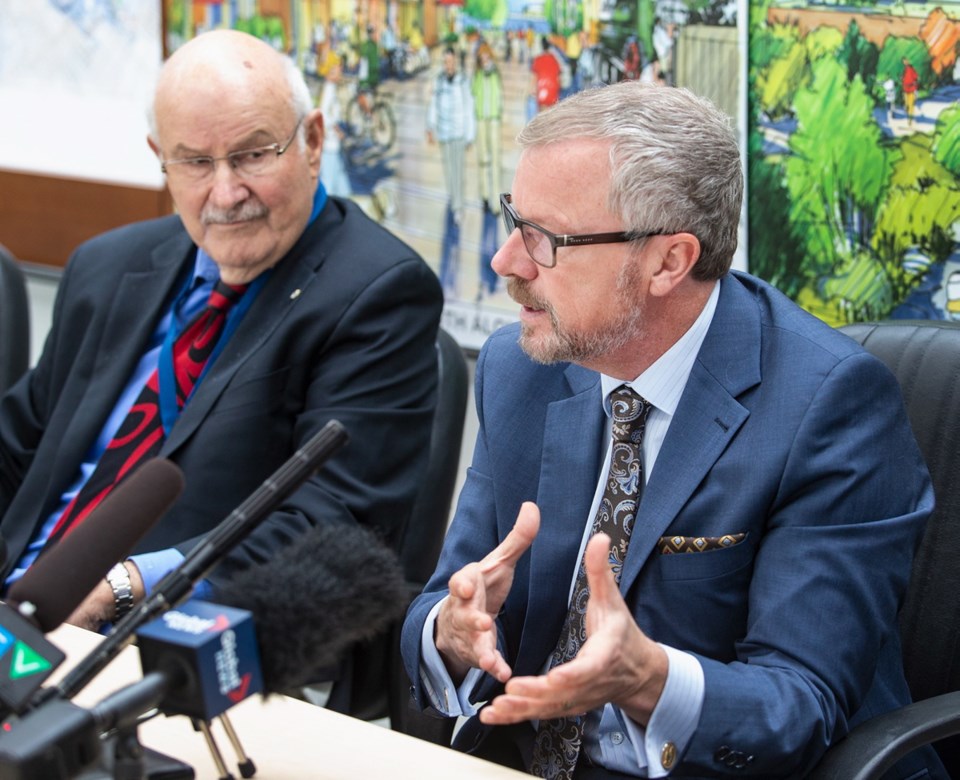 Two former premiers issued warnings Tuesday about the negative impact of some B.C. tax moves, urging the NDP government to take a second look.
Two former premiers issued warnings Tuesday about the negative impact of some B.C. tax moves, urging the NDP government to take a second look.
Mike Harcourt, B.C.’s NDP premier from 1991 to 1995, said the extra school tax being imposed on homes over $3 million is unfair. Former Saskatchewan premier Brad Wall questioned whether the speculation tax is hurting B.C.’s brand as a destination that welcomes Canadians and the world.
The two were on a panel about the B.C. housing crisis, sponsored by Ken and Patricia Mariash at Bayview Place’s Roundhouse.
“It’s not a crisis, it’s a permanent condition,” Harcourt said, referring to global urbanization pressures in general and to urban B.C.’s steady increase in demand over the past several years, with accompanying price surges.
Several hundred people attended and the focus was kept on NDP tax measures.
The NDP election campaign focused on criticizing the B.C. Liberals for doing little about housing affordability problems, and promised to get 114,000 units built over 10 years. A variety of tax measures were brought in to fund the program, and to curb demand.
But Harcourt parted company with his party over one of them — an extra school tax next year on homes over $3 million, expected to bring in $200 million a year.
“A school tax added to a school tax is a bad idea,” he said. “It’s really just piling on, and I think it’s unfair. It’s taxing people on gains they haven’t realized. It’s a bad way to do it.”
He said increasing personal income tax at the high end by just a quarter per cent would make up all the money the new school tax is projected to bring in.
Harcourt’s government introduced a similar measure in the 1990s but was forced to back down after a homeowner revolt.
He said he didn’t learn it was in the budget until later and had to face down his cabinet to rescind it. “They had 18 votes, and I had 19,” he joked.
He has maintained an interest in urban development and said single-family homes are a thing of the past. The zoning should be rescinded throughout the Lower Mainland, in favour of duplexes, townhouses, laneway homes and condos.
He also rapped local approval delays, saying planning officials should be extracted from decisions they shouldn’t be making. The process should be streamlined. “Stop consulting everyone.”
It took him 11 months to get approval for his home project in �鶹��ýӳ��and one of the sticking points was the type of railings on a balcony.
Wall, now a special adviser to a Calgary law firm, expressed doubt about another housing related measure, the speculation tax. “I’ve got folks at home (Swift Current), they don’t necessarily feel very welcome any more.”
B.C. means “bring cash,” he said.
The tax was presented in February as a two per cent annual levy in five regions of B.C. on homes that weren’t occupied year-round. Widespread concern prompted a partial retreat later, as some areas within the regions were exempted and the rate was reduced for B.C. owners and those from other provinces.
Wall said there are already concerns in Canada about how open B.C. is to investment over the pipeline argument. Taxing out-of-province owners of homes left empty part of the year adds to those concerns. “It might have been better named the ‘missing the point tax.’ ”
He said he knows someone who bought a condo in Victoria so his son could attend school, but is now re-assessing because of the added costs. The son might go elsewhere.
Mariash, whose firm owns the 20-acre site where the forum was held, said his long-term development is now frozen by city hall, because the permits for several more buildings haven’t been issued.
Mayor Lisa Helps opened the event by noting that approval times at city hall have gone from estimated three years to a point where 90 per cent are approved within six to eight months.
She said that Greater Victoria mayors have been working on an on alternative to the speculation tax, a capital gains tax concept.



